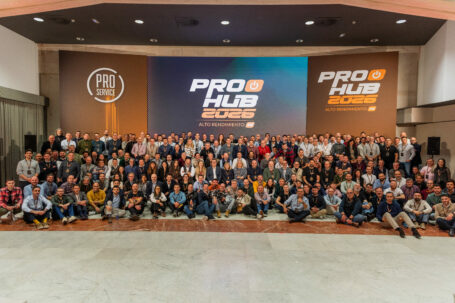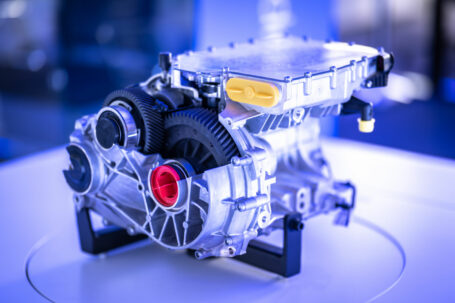Grupo Volkswagen: Andreas Mindt nombrado nuevo director de Diseño del Grupo

-
Andreas Mindt, director de Diseño de la marca Volkswagen, también dirigirá el Diseño del Grupo Volkswagen a partir del 1 de marzo de 2026
-
Sucede a Michael Mauer, que deja la empresa de forma amistosa en el marco del relevo generacional
-
El CEO de Volkswagen, Oliver Blume, agradeció a Michael Mauer la estrecha y colaborativa relación de trabajo: "Ha marcado una época en Porsche. Como director de Diseño del Grupo, también ha establecido una filosofía de diseño en todas las marcas que proporciona orientación y garantiza el reconocimiento, con identidades de marca y de producto claramente definidas. Su trabajo ha marcado el estilo de nuestras marcas y seguirá siendo visible en el futuro"
Andreas Mindt, director de Diseño de la marca Volkswagen, asumirá además la dirección de Diseño del Grupo Volkswagen a partir del 1 de marzo de 2026. Sucede en el cargo a Michael Mauer, que abandona la empresa de forma amistosa como parte de una transición generacional. Mauer ya había transferido sus responsabilidades en Porsche a su sucesor.
Oliver Blume, CEO del Grupo Volkswagen: «Me gustaría expresar mi más sincero agradecimiento a Michael Mauer por su excelente trabajo y por la estrecha y colaborativa relación laboral que hemos mantenido a lo largo de los años. Ha marcado una época en Porsche. Como director de Diseño del Grupo, también ha establecido una filosofía de diseño en todas las marcas que proporciona orientación y garantiza el reconocimiento – con identidades de marca y de producto claramente definidas. Su trabajo ha marcado el estilo de nuestras marcas y seguirá siendo visible en el futuro».
Perfeccionar la estrategia de diseño con productos inconfundibles ha sido una de las principales prioridades del Grupo durante más de tres años. «Michael Mauer logró precisamente lo que nos propusimos en poco tiempo», afirmó Blume. «Las marcas individuales desarrollaron su ADN y definieron su posicionamiento. Sus modelos icónicos reflejan de forma auténtica y emocional su origen, y ofrecen lo que nuestros clientes de todo el mundo esperan de nosotros».
Ahora es el momento de pasar el testigo a la siguiente generación. «Estoy deseando trabajar más estrechamente con Andy Mindt», afirmó Blume. «Con su trayectoria en la marca Volkswagen y su experiencia, ha tenido un impacto significativo en poco tiempo y ha desempeñado un papel clave para garantizar que nuestros coches vuelvan a ser claramente reconocibles como auténticos modelos Volkswagen”.
Andreas Mindt comenzó su carrera en el Grupo Volkswagen en 1996 tras graduarse en la Escuela de Diseño de la Universidad de Pforzheim. En 2014 ya había ocupado varios puestos en la marca Volkswagen, trabajando en el diseño de la primera generación del Tiguan y en el diseño exterior del Golf 7, entre otras cosas. Desde 2014 hasta 2021, encabezó la reorientación del diseño exterior de Audi, desde el Audi A1 hasta el Audi e-tron GT y desde el Audi Q3 hasta el Audi Q8. A partir de 2021, como director de Bentley Design, se le encomendó la tarea de definir el nuevo lenguaje de diseño de Bentley, presentado el verano pasado con el Bentley Batur. Desde febrero de 2023 ocupa el cargo de director de diseño de la marca Volkswagen Passenger Cars.
Michael Mauer asumió el cargo en 2004 como cuarto director de Diseño en la larga historia de Porsche, precedido por Ferdinand Alexander Porsche, Anatol Lapine y Harm Lagaay. Mauer estudió diseño automovilístico en la Universidad de Ciencias Aplicadas de Pforzheim y se incorporó a Porsche tras pasar por Mercedes, Smart y Saab. Al comienzo de su mandato en Porsche AG, fue responsable de la revisión del Cayenne, el nuevo Panamera y el superdeportivo 918 Spyder. Michael Mauer también trasladó el inconfundible diseño de Porsche a la era eléctrica. Desde enero de 2023, ejerce como director de diseño del Grupo Volkswagen, al tiempo que mantiene su cargo en Porsche.
La importancia del diseño para el Grupo Volkswagen
El diseño desempeña un papel decisivo para el Grupo Volkswagen. La tarea de Group Design es diferenciar claramente las distintas marcas y hacer visible su ADN específico. Cada marca debe ser reconocible al instante y comunicar de forma auténtica su origen. Group Design también se asegura de que todos los productos satisfagan las necesidades de cada región y mercado y estén a la altura de las diferentes expectativas de los clientes en todo el mundo.




